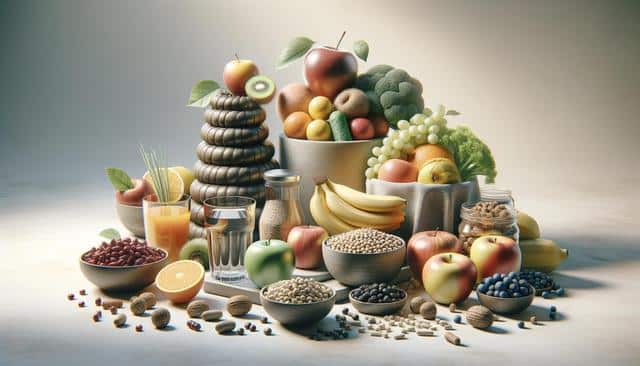Simple Food Tips That Support Digestive Health and Relieve Constipation
Discover which foods naturally ease constipation in this simple guide. Learn how fiber-rich fruits, vegetables, whole grains, and hydration can support healthy digestion, promote regular bowel movements, and help you feel lighter, more comfortable, and energized every day.

Understanding the Role of Fiber in Digestion
Fiber is one of the most important nutrients when it comes to maintaining a healthy digestive system and relieving constipation. Dietary fiber, particularly insoluble fiber, adds bulk to stool and helps it move more easily through the intestines. Soluble fiber, on the other hand, absorbs water and forms a gel-like substance that softens stool and promotes smoother bowel movements. Both types of fiber are essential for digestive health and can be found in a variety of plant-based foods.
Incorporating more high-fiber foods into your meals is a simple and effective way to support digestion. Some examples include:
- Whole grains like oats, brown rice, and quinoa
- Legumes such as lentils, chickpeas, and black beans
- Fruits like apples, pears, and berries with the skin on
- Vegetables such as carrots, broccoli, and spinach
When increasing fiber intake, it’s important to do so gradually and to drink plenty of water. A sudden increase in fiber without adequate hydration can actually lead to bloating and discomfort.
The Importance of Hydration for Regularity
Drinking enough water throughout the day is vital for keeping the digestive system functioning efficiently. Water helps break down food, absorb nutrients, and soften stool, making it easier to pass. Dehydration is a common cause of constipation, as dry stools are more difficult to move through the colon.
To stay properly hydrated:
- Aim for at least 8 glasses (about 2 liters) of water per day
- Include water-rich foods such as cucumbers, watermelon, and oranges
- Drink herbal teas or clear broths to supplement water intake
Hydration works in harmony with fiber. Without enough fluids, even a fiber-rich diet may not effectively alleviate constipation. Making hydration a daily priority supports numerous bodily functions and significantly contributes to digestive comfort.
Fruit and Vegetable Choices That Ease Constipation
Fruits and vegetables are naturally high in fiber and water content, making them ideal choices for promoting digestive health. Many also contain natural sugars like sorbitol and fructose, which can have a mild laxative effect when consumed in moderation.
Some fruits that are particularly helpful for relieving constipation include:
- Prunes and prune juice, which contain sorbitol and fiber
- Kiwi, known for its digestive enzymes and fiber content
- Papaya, which contains the enzyme papain that aids digestion
- Pears and apples, especially when eaten with the peel
Vegetables that support digestion include leafy greens, zucchini, sweet potatoes, and Brussels sprouts. These not only provide dietary fiber but also essential vitamins and minerals that promote overall gut health. Including a variety of colorful produce in your daily meals can help support regularity and improve nutrient absorption.
Whole Grains for Sustained Digestive Support
Whole grains are an excellent source of insoluble fiber, which helps move material through the digestive tract and adds bulk to stool. Unlike refined grains, whole grains retain their bran and germ, where most of the fiber and nutrients are found. Regular consumption of whole grains has been associated with improved bowel movements and a reduction in digestive discomfort.
Some whole grains to consider adding to your meals include:
- Oats, which also contain soluble fiber that supports heart and gut health
- Brown rice as a simple, versatile side dish
- Barley and bulgur for soups and salads
- Whole wheat bread and pasta, when consumed in moderation
Start by replacing refined grain products with their whole grain counterparts. For instance, choose whole grain bread instead of white bread or swap white rice with brown rice. Over time, these small changes can lead to significant improvements in digestive health and regularity.
Probiotic Foods and Their Role in Gut Health
Probiotics are beneficial bacteria that support a balanced gut microbiome. A healthy gut flora is essential for digestion, nutrient absorption, and immune function. Probiotic-rich foods can help regulate bowel movements and may relieve symptoms of constipation in some individuals by improving the overall health of the digestive tract.
Common probiotic foods include:
- Yogurt with live cultures
- Fermented vegetables such as sauerkraut and kimchi
- Kefir, a fermented milk drink
- Miso and tempeh, both made from fermented soybeans
It’s also beneficial to include prebiotic foods, such as garlic, onions, and bananas, which feed the good bacteria in your gut. Together, probiotics and prebiotics help maintain a thriving digestive environment that supports regularity and reduces discomfort.
Conclusion: Making Digestive-Friendly Choices Part of Your Routine
Improving digestion and relieving constipation doesn’t have to involve drastic changes. By consistently incorporating fiber-rich fruits and vegetables, hydrating well, choosing whole grains, and introducing probiotic foods into your diet, you can support long-term digestive health. These small, sustainable dietary habits can lead to noticeable improvements in how you feel day to day. Whether you’re seeking relief or aiming to maintain regularity, these food tips provide a practical and natural approach to supporting your digestive system.